人教新目标(Go for it)版七年级下册Unit 11 How was your school trip? Section B 1a~2c课件(共35张PPT)
文档属性
| 名称 | 人教新目标(Go for it)版七年级下册Unit 11 How was your school trip? Section B 1a~2c课件(共35张PPT) |
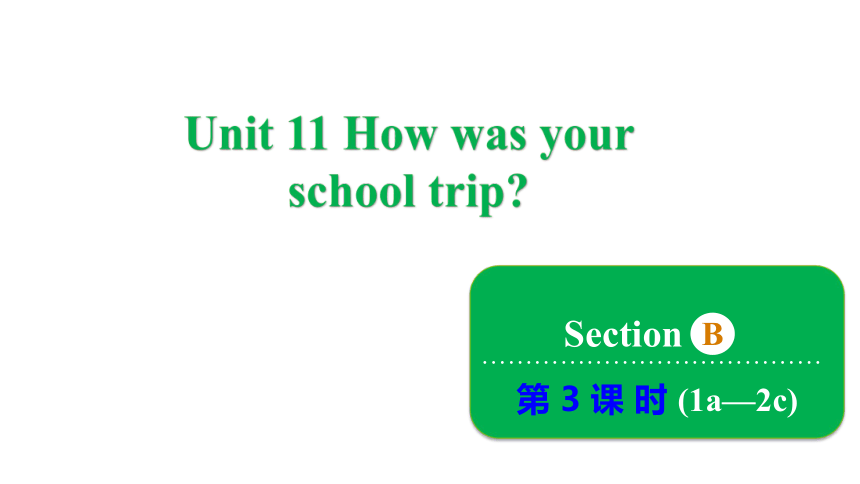
|
|
| 格式 | pptx | ||
| 文件大小 | 2.1MB | ||
| 资源类型 | 教案 | ||
| 版本资源 | 人教新目标(Go for it)版 | ||
| 科目 | 英语 | ||
| 更新时间 | 2024-05-02 00:00:00 | ||
图片预览

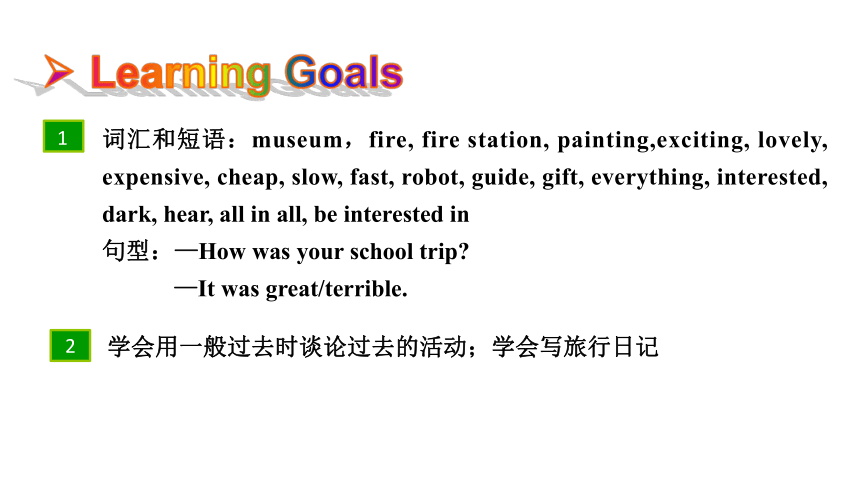
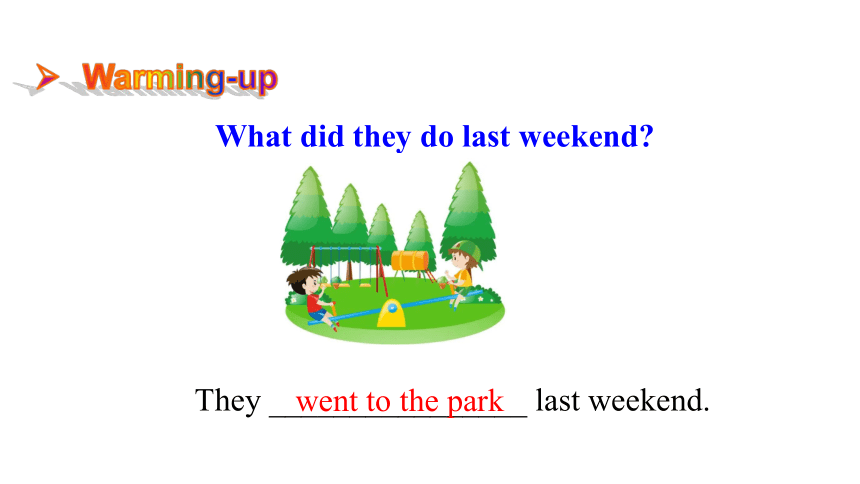
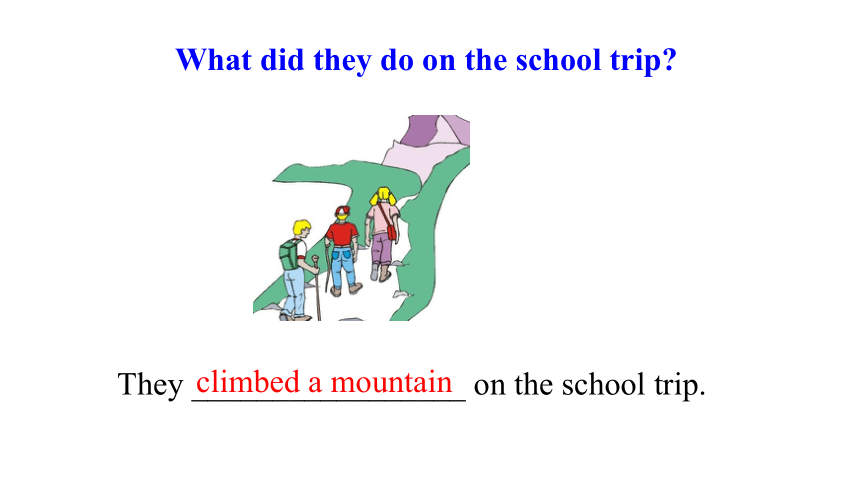
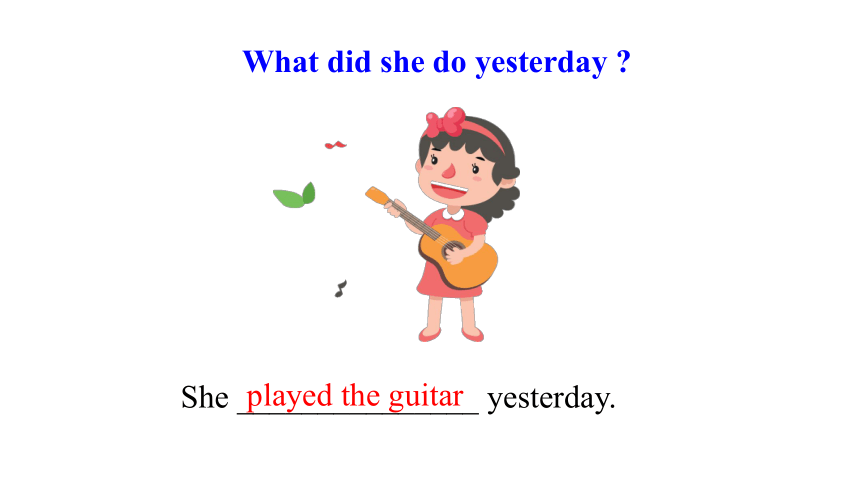
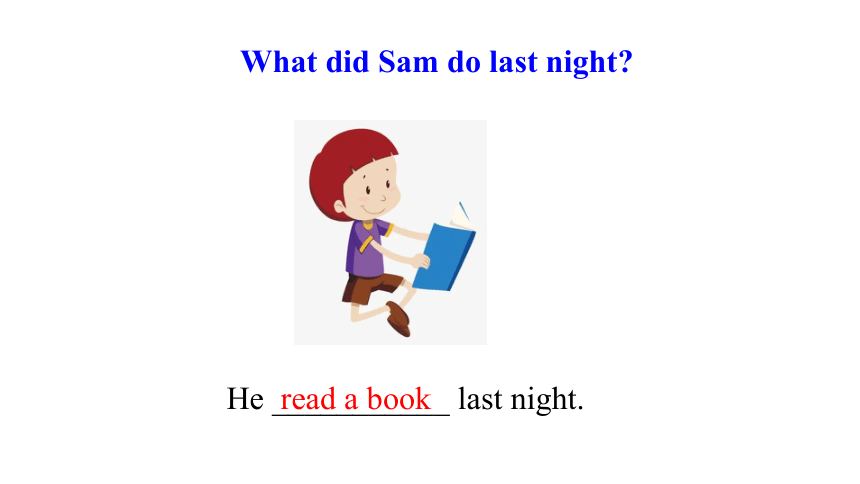
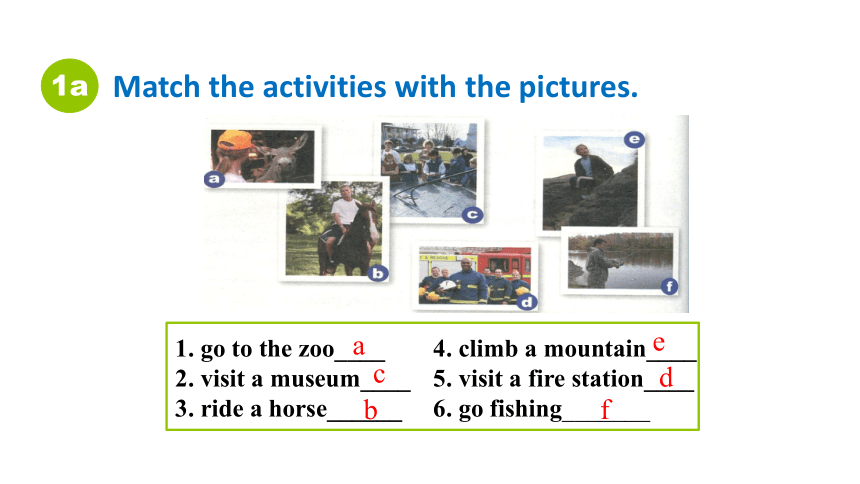
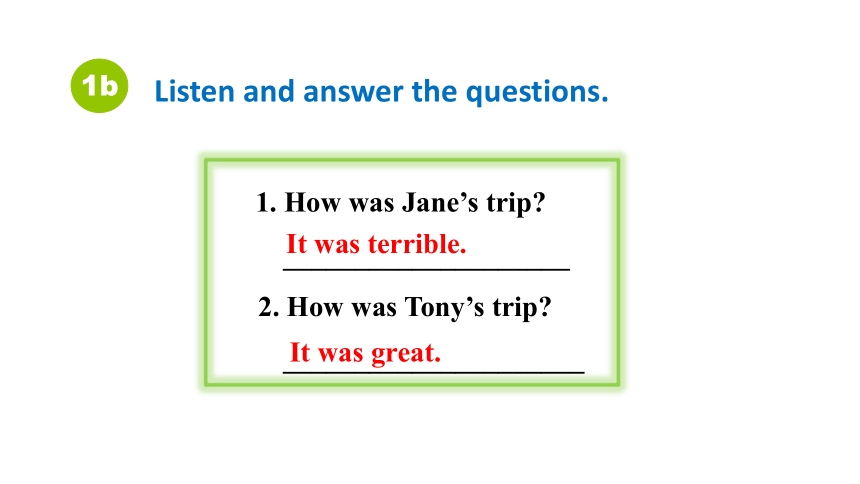
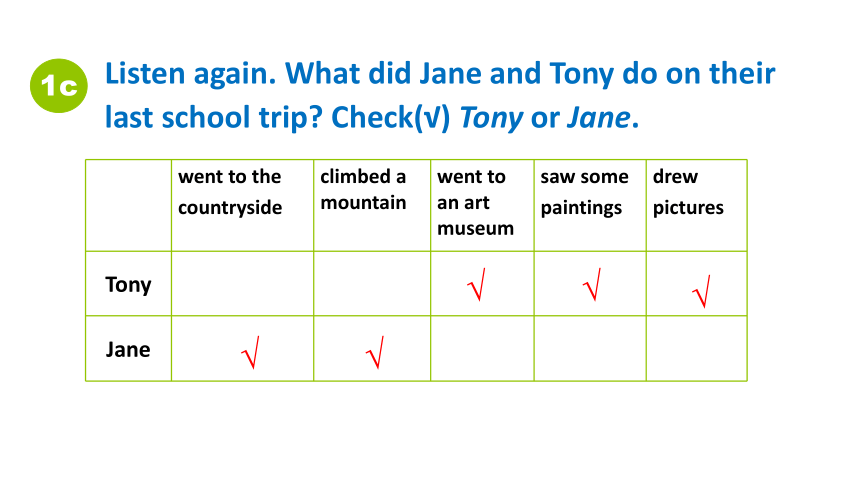
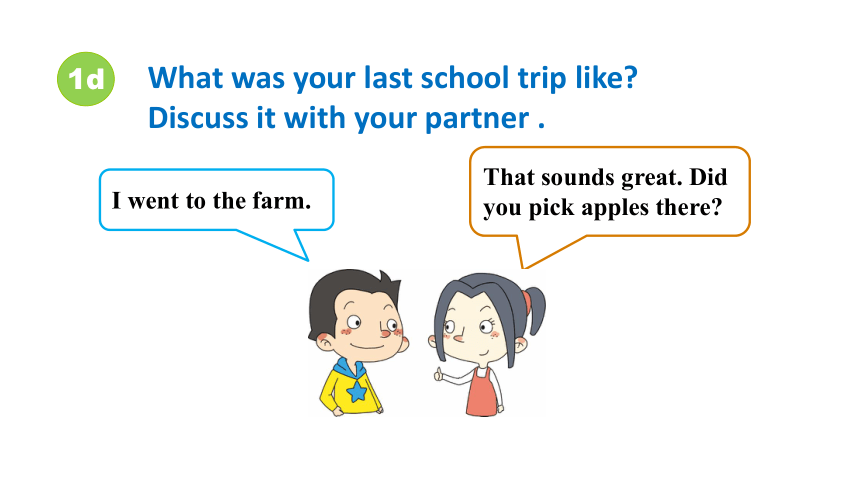
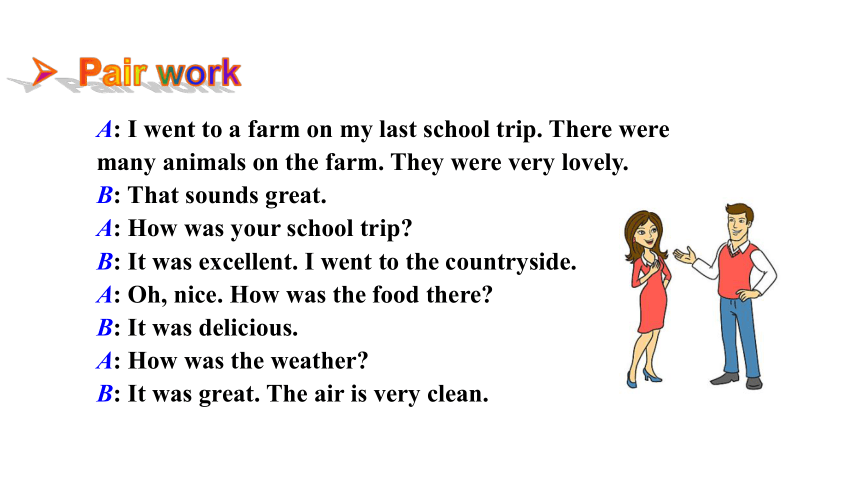
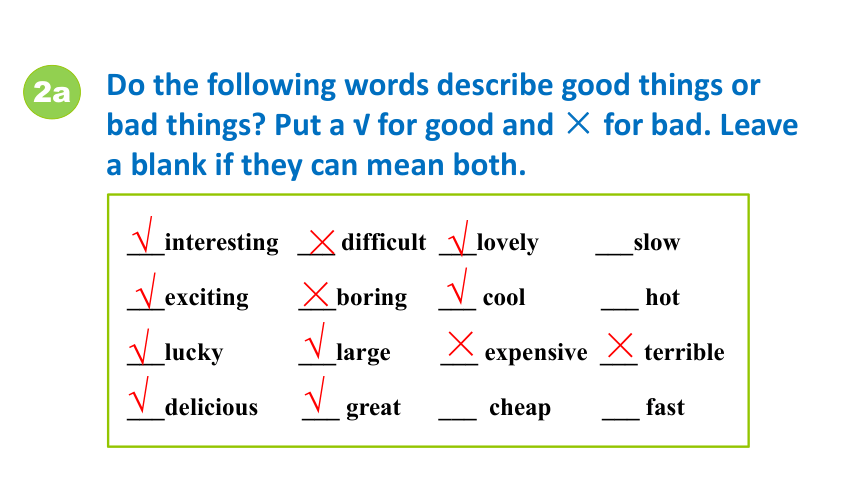
文档简介
(共35张PPT)
Section
Unit 11 How was your school trip
第 3 课 时 (1a—2c)
…………………………………
B
词汇和短语:museum,fire, fire station, painting,exciting, lovely, expensive, cheap, slow, fast, robot, guide, gift, everything, interested, dark, hear, all in all, be interested in
句型:—How was your school trip
—It was great/terrible.
1
学会用一般过去时谈论过去的活动;学会写旅行日记
2
Learning Goals
2
They ________________ last weekend.
went to the park
What did they do last weekend
Warming-up
They _________________ on the school trip.
climbed a mountain
What did they do on the school trip
She _______________ yesterday.
played the guitar
What did she do yesterday
He ___________ last night.
read a book
What did Sam do last night
Match the activities with the pictures.
1. go to the zoo____
2. visit a museum____
3. ride a horse______
4. climb a mountain____
5. visit a fire station____
6. go fishing_______
a
c
b
e
d
f
1a
Listen and answer the questions.
1. How was Jane’s trip
____________________
2. How was Tony’s trip
_____________________
It was terrible.
It was great.
1b
Listen again. What did Jane and Tony do on their last school trip Check(√) Tony or Jane.
went to the countryside climbed a mountain went to an art museum saw some paintings drew
pictures
Tony
Jane
√
√
√
√
√
1c
What was your last school trip like Discuss it with your partner .
I went to the farm.
That sounds great. Did you pick apples there
1d
A: I went to a farm on my last school trip. There were many animals on the farm. They were very lovely.
B: That sounds great.
A: How was your school trip
B: It was excellent. I went to the countryside.
A: Oh, nice. How was the food there
B: It was delicious.
A: How was the weather
B: It was great. The air is very clean.
Pair work
Do the following words describe good things or bad things Put a √ for good and × for bad. Leave a blank if they can mean both.
___interesting ___ difficult ___lovely ___slow
___exciting ___boring ___ cool ___ hot
___lucky ___large ___ expensive ___ terrible
___delicious ___ great ___ cheap ___ fast
√
√
√
√
√
√
√
√
×
×
×
×
2a
1. Did Helen and Jim go on the same trip
Yes, they did. They went on the same trip.
Read Helen’s and Jim’s diary entries and answer the questions.
2. How do they feel about the trip
Helen thought the trip was really interesting. But Jim thought the trip was terrible.
2b
June 15th
Today I went on a school trip. We visited the science museum and it was really interesting. We got there so fast by train. We saw some farms and villages along the way. At the museum, I learned a lot about robots. I didn’t know they could play chess with us. It was so cool!
Then the guide taught us how to make a model robot. I took a lot of great photos, too. After that, I went to the gift shop and bought some lovely gifts for my parents. They weren’t expensive. All in all, it was an exciting day.?
June 15th
I think today’s school trip was terrible. We took the train to the museum. It was so hot on the slow train. The museum was big and boring. Everything was about robots and I’m not interested in that.
The rooms were really dark and it was difficult to take photos, so I didn’t take any. There were also too many people and I couldn’t really see or hear the guide. The things in the gift shop were so expensive. I didn’t like the trip at all.
Helen Jim
the trip
the train
the museum
the gift shop and gifts
Complete the chart. How do Helen and Jim describe these things
exciting
fast
really interesting
lovely, not expensive
terrible
slow
big, boring, really dark, too many people
so expensive
2c
Today I went on a school trip. 今天我参加了一次学校旅行。
go on a trip 意为“去旅行”,相当于have a trip。
go on a trip to… 意为“到……去旅行”。
We went on a school trip last week.
上周我们进行了一次学校旅行。
Language points
1
【拓展】go on a trip 类似的短语
go on a hike 去远足
go on a visit 去访问
go on vacation 去度假
I didn’t know they could play chess with us.
我不知道他们能和我们下棋。
play 后面接球类、棋类、牌类等体育运动名称时,前面不加冠词,如:play basketball打篮球;play后接乐器时,前面则加定冠词,如: play the violin拉小提琴, play the piano弹钢琴。
2
【讲解】
Then the guide taught us how to make a model robot.
然后导游教我们如何制作机器人模型。
teach sb. to do sth. 教某人做某事
teach sb. sth. 教某人某事
teach oneself 自学
3
1.teach 的相关搭配
疑问词包括:疑问代词:what, which, who, whose
疑问副词:when, where, how等。
这些疑问词和动词不定式一起构成了动词不定式短语。在句子中可作主语、宾语、表语等。
2.“疑问词+动词不定式”结构
how to make a model robot 为“疑问词+动词不定式”结构。
All in all, it was an exciting day. 总之,这是令人
兴奋的一天。
1. all in all 总的来说,总而言之
2. an exciting day 令人兴奋的一天
4
【辨析】exciting 和excited
exciting是形容词, 意思是“让人兴奋的,使人兴奋的”,
多修饰事物。excited也是形容词, 多用来形容人的感受,类似的形容词还有:interesting, interested; boring, bored等
I think today’s school trip was terrible. 我觉得
今天的学校旅行糟透了。
本句为含有宾语从句的主从复合句。主句为一般现在时态,宾语从句根据具体情况选用所需时态。宾语从句要保持陈述语序。
I think math is hard.我认为数学很难。
5
【讲解】
当主句的主语是第一人称且谓语是think,believe等词,如果要对宾语从句进行否定时,常把否定转移到主句上来,即“否定转移”。
I don’t think you are right. 我认为你不对。
【拓展】
Everything was about robots and I’m not interested in that.每个东西都是关于机器人的,我对此不感兴趣。
be interested in 对……感兴趣
We are interested in English.
我们对英语感兴趣。
6
There were also too many people.人也太多了。
too many“太多”,修饰 可数名词
too many students 太多学生
too much“太多”修饰不可数名词
too much water 太多水
much too “太......” 修饰形容词或副词
much too cold 太冷
7
【辨析】too many, too much ,much too
interested interesting
人对事物感兴趣 事物本身有趣
用于句型 be (become) interested in
可作定语和表语
【辨析】interested和interesting
I didn’t like the trip at all. 我一点儿都不喜欢这次旅行。
not… at all “一点也不;根本不”
I don’t like apples at all.
我根本不喜欢吃苹果。
8
一、单项选择
1. Were there _____ sharks
A. some B. any C. a lot
2. What _____ did you do
A. other B. else C. others
3. —Were you at home yesterday
— _____.
A. Yes, I were B. Yes, I am. C. Yes, I was.
B
B
C
Exercises
4. —Did they take any photos
—______.
A. No, they didn't B. No, they did
C. No, they aren't
5. My mother _______ some cakes for us last night.
A. makes B. maked C. made
A
C
二、按要求完成句子。
1. Two years ago, she often _______ (feed) her dog in
the morning.
2. Tom’s mother _________(grow) some tomatoes in
her garden last summer.
3. Our trip was pretty good. (对画线部分提问)
_____ _______ your trip
fed
grew
How was
4. Can you teach me how _______ _______ (use) a computer
5. I know how ______ _______ (spell) the word.
6. It’s easy _______ ________ (learn) English.
to use
to spell
to learn
Homework
1. Review the words andsentences that we have learned today.
2. Write a passage about your favourite
trip.
Section
Unit 11 How was your school trip
第 3 课 时 (1a—2c)
…………………………………
B
词汇和短语:museum,fire, fire station, painting,exciting, lovely, expensive, cheap, slow, fast, robot, guide, gift, everything, interested, dark, hear, all in all, be interested in
句型:—How was your school trip
—It was great/terrible.
1
学会用一般过去时谈论过去的活动;学会写旅行日记
2
Learning Goals
2
They ________________ last weekend.
went to the park
What did they do last weekend
Warming-up
They _________________ on the school trip.
climbed a mountain
What did they do on the school trip
She _______________ yesterday.
played the guitar
What did she do yesterday
He ___________ last night.
read a book
What did Sam do last night
Match the activities with the pictures.
1. go to the zoo____
2. visit a museum____
3. ride a horse______
4. climb a mountain____
5. visit a fire station____
6. go fishing_______
a
c
b
e
d
f
1a
Listen and answer the questions.
1. How was Jane’s trip
____________________
2. How was Tony’s trip
_____________________
It was terrible.
It was great.
1b
Listen again. What did Jane and Tony do on their last school trip Check(√) Tony or Jane.
went to the countryside climbed a mountain went to an art museum saw some paintings drew
pictures
Tony
Jane
√
√
√
√
√
1c
What was your last school trip like Discuss it with your partner .
I went to the farm.
That sounds great. Did you pick apples there
1d
A: I went to a farm on my last school trip. There were many animals on the farm. They were very lovely.
B: That sounds great.
A: How was your school trip
B: It was excellent. I went to the countryside.
A: Oh, nice. How was the food there
B: It was delicious.
A: How was the weather
B: It was great. The air is very clean.
Pair work
Do the following words describe good things or bad things Put a √ for good and × for bad. Leave a blank if they can mean both.
___interesting ___ difficult ___lovely ___slow
___exciting ___boring ___ cool ___ hot
___lucky ___large ___ expensive ___ terrible
___delicious ___ great ___ cheap ___ fast
√
√
√
√
√
√
√
√
×
×
×
×
2a
1. Did Helen and Jim go on the same trip
Yes, they did. They went on the same trip.
Read Helen’s and Jim’s diary entries and answer the questions.
2. How do they feel about the trip
Helen thought the trip was really interesting. But Jim thought the trip was terrible.
2b
June 15th
Today I went on a school trip. We visited the science museum and it was really interesting. We got there so fast by train. We saw some farms and villages along the way. At the museum, I learned a lot about robots. I didn’t know they could play chess with us. It was so cool!
Then the guide taught us how to make a model robot. I took a lot of great photos, too. After that, I went to the gift shop and bought some lovely gifts for my parents. They weren’t expensive. All in all, it was an exciting day.?
June 15th
I think today’s school trip was terrible. We took the train to the museum. It was so hot on the slow train. The museum was big and boring. Everything was about robots and I’m not interested in that.
The rooms were really dark and it was difficult to take photos, so I didn’t take any. There were also too many people and I couldn’t really see or hear the guide. The things in the gift shop were so expensive. I didn’t like the trip at all.
Helen Jim
the trip
the train
the museum
the gift shop and gifts
Complete the chart. How do Helen and Jim describe these things
exciting
fast
really interesting
lovely, not expensive
terrible
slow
big, boring, really dark, too many people
so expensive
2c
Today I went on a school trip. 今天我参加了一次学校旅行。
go on a trip 意为“去旅行”,相当于have a trip。
go on a trip to… 意为“到……去旅行”。
We went on a school trip last week.
上周我们进行了一次学校旅行。
Language points
1
【拓展】go on a trip 类似的短语
go on a hike 去远足
go on a visit 去访问
go on vacation 去度假
I didn’t know they could play chess with us.
我不知道他们能和我们下棋。
play 后面接球类、棋类、牌类等体育运动名称时,前面不加冠词,如:play basketball打篮球;play后接乐器时,前面则加定冠词,如: play the violin拉小提琴, play the piano弹钢琴。
2
【讲解】
Then the guide taught us how to make a model robot.
然后导游教我们如何制作机器人模型。
teach sb. to do sth. 教某人做某事
teach sb. sth. 教某人某事
teach oneself 自学
3
1.teach 的相关搭配
疑问词包括:疑问代词:what, which, who, whose
疑问副词:when, where, how等。
这些疑问词和动词不定式一起构成了动词不定式短语。在句子中可作主语、宾语、表语等。
2.“疑问词+动词不定式”结构
how to make a model robot 为“疑问词+动词不定式”结构。
All in all, it was an exciting day. 总之,这是令人
兴奋的一天。
1. all in all 总的来说,总而言之
2. an exciting day 令人兴奋的一天
4
【辨析】exciting 和excited
exciting是形容词, 意思是“让人兴奋的,使人兴奋的”,
多修饰事物。excited也是形容词, 多用来形容人的感受,类似的形容词还有:interesting, interested; boring, bored等
I think today’s school trip was terrible. 我觉得
今天的学校旅行糟透了。
本句为含有宾语从句的主从复合句。主句为一般现在时态,宾语从句根据具体情况选用所需时态。宾语从句要保持陈述语序。
I think math is hard.我认为数学很难。
5
【讲解】
当主句的主语是第一人称且谓语是think,believe等词,如果要对宾语从句进行否定时,常把否定转移到主句上来,即“否定转移”。
I don’t think you are right. 我认为你不对。
【拓展】
Everything was about robots and I’m not interested in that.每个东西都是关于机器人的,我对此不感兴趣。
be interested in 对……感兴趣
We are interested in English.
我们对英语感兴趣。
6
There were also too many people.人也太多了。
too many“太多”,修饰 可数名词
too many students 太多学生
too much“太多”修饰不可数名词
too much water 太多水
much too “太......” 修饰形容词或副词
much too cold 太冷
7
【辨析】too many, too much ,much too
interested interesting
人对事物感兴趣 事物本身有趣
用于句型 be (become) interested in
可作定语和表语
【辨析】interested和interesting
I didn’t like the trip at all. 我一点儿都不喜欢这次旅行。
not… at all “一点也不;根本不”
I don’t like apples at all.
我根本不喜欢吃苹果。
8
一、单项选择
1. Were there _____ sharks
A. some B. any C. a lot
2. What _____ did you do
A. other B. else C. others
3. —Were you at home yesterday
— _____.
A. Yes, I were B. Yes, I am. C. Yes, I was.
B
B
C
Exercises
4. —Did they take any photos
—______.
A. No, they didn't B. No, they did
C. No, they aren't
5. My mother _______ some cakes for us last night.
A. makes B. maked C. made
A
C
二、按要求完成句子。
1. Two years ago, she often _______ (feed) her dog in
the morning.
2. Tom’s mother _________(grow) some tomatoes in
her garden last summer.
3. Our trip was pretty good. (对画线部分提问)
_____ _______ your trip
fed
grew
How was
4. Can you teach me how _______ _______ (use) a computer
5. I know how ______ _______ (spell) the word.
6. It’s easy _______ ________ (learn) English.
to use
to spell
to learn
Homework
1. Review the words andsentences that we have learned today.
2. Write a passage about your favourite
trip.
同课章节目录
- Unit 1 Can you play the guitar?
- Section A
- Section B
- Unit 2 What time do you go to school?
- Section A
- Section B
- Unit 3 How do you get to school?
- Section A
- Section B
- Unit 4 Don't eat in class.
- Section A
- Section B
- Unit 5 Why do you like pandas?
- Section A
- Section B
- Unit 6 I'm watching TV.
- Section A
- Section B
- Review of Units 1-6
- Unit 7 It's raining!
- Section A
- Section B
- Unit 8 Is there a post office near here?
- Section A
- Section B
- Unit 9 What does he look like?
- Section A
- Section B
- Unit 10 I'd like some noodles.
- Section A
- Section B
- Unit 11 How was your school trip?
- Section A
- Section B
- Unit 12 What did you do last weekend?
- Section A
- Section B
